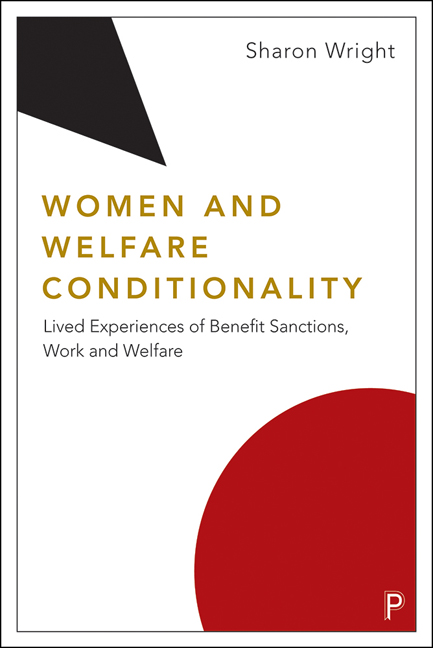Book contents
- Frontmatter
- Contents
- List of figure, tables and charts
- List of abbreviations
- Acknowledgements
- one What does work-based welfare reform mean for women?
- two Re-theorising conditional welfare as gendered lived experience and street-level practice
- three Policy context: the hidden gendered impacts of conditional welfare reforms
- four Rewriting retirement as ‘work experience’: older women’s gendered encounters with the work ethic
- five Crushing conditionality: women living through heavily enforced work-related conditionality
- six In the shadow of sanctions: disciplining women and children for violating male-defined work norms
- seven Conclusions
- Appendix 1 The Welfare Conditionality study
- Appendix 2 Sanctions overviews
- Notes
- References
- Index
four - Rewriting retirement as ‘work experience’: older women’s gendered encounters with the work ethic
Published online by Cambridge University Press: 27 March 2024
- Frontmatter
- Contents
- List of figure, tables and charts
- List of abbreviations
- Acknowledgements
- one What does work-based welfare reform mean for women?
- two Re-theorising conditional welfare as gendered lived experience and street-level practice
- three Policy context: the hidden gendered impacts of conditional welfare reforms
- four Rewriting retirement as ‘work experience’: older women’s gendered encounters with the work ethic
- five Crushing conditionality: women living through heavily enforced work-related conditionality
- six In the shadow of sanctions: disciplining women and children for violating male-defined work norms
- seven Conclusions
- Appendix 1 The Welfare Conditionality study
- Appendix 2 Sanctions overviews
- Notes
- References
- Index
Summary
Karen was born in 1955 and “grew up before the human rights thing”. She launched her Royal Navy career in the early 1970s but, two years later, it was over when it had barely begun. Karen was discharged for breaching her contract by becoming pregnant. Because it happened before the Sex Discrimination Act 1975, Karen was lawfully denied her job and her occupational pension for those years of service.
Like many married women at the time, Karen prioritised raising her children. When her marriage ended in the 1980s, she wanted to work but “there was no childcare and all that sort of stuff”. She took part in a local authority initiative for women returners, got a diploma for office work and did a government training scheme working as an administrator with a benefit top-up of £15 per week.
Karen’s “strong work pride” spurred her on and she had full-time and part-time employment continuously for 30 years. These were mainly administrative jobs and varied widely, including managing multimillionpound contracts for a government department, legal work and support for female survivors of violence and sexual assault.
In 1995, half-way through her working life, the government rewrote state pension law. Instead of retiring at 60, Karen would have to wait until 66. Karen was 59 when we first interviewed her in 2015. She gets Universal Credit and is legally required to look for full-time work to receive financial support. At the second interview, Karen is 60 – the age she had expected to retire. She wishes she “could spend time … with my grandchildren and if I wanted to work I could but then it would be choice rather than being forced. I still would”.
Aged 61, the third time we speak to her, Karen has held a series of transitory jobs, volunteered and completed work placements. As for training courses, she has “done them all”. Her generation was the last to be legally excluded from work because of pregnancy and the first to be legally mandated to work full-time beyond 60. Instead of retiring, Karen is stuck in a ‘work preparation’ holding pattern.
- Type
- Chapter
- Information
- Women and Welfare ConditionalityLived Experiences of Benefit Sanctions, Work and Welfare, pp. 68 - 84Publisher: Bristol University PressPrint publication year: 2023



